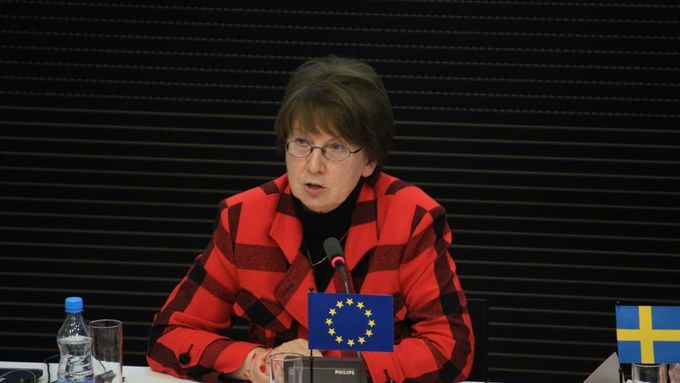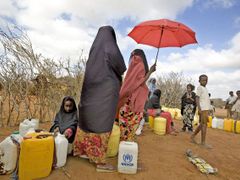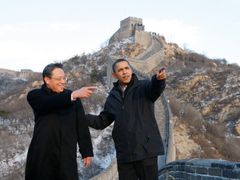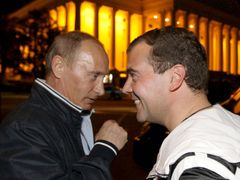Prague - The world of the 21st century undeniably faces new global challenges - from terrorism, nuclear power, ecological refugees to drug cartels and pirates.
"It is not as it used to be in the 1960s when one telephone call was good enough to secure the safety of the world," Prague 6 mayor Tomáš Chalupa said at a conference titled the Security of the European Union and Czech Republic in the multipolar world in the 21st century that took place in Prague.
"Today we don't even know what number to call," he added half-jokingly.
With the end of the bipolar division of the world and new players entering the scene of global economics and politics, the global powers are being transformed and shifted. Among the new rising superpowers are China, India, Russia and Brazil. Should we be afraid of them?
Swedish expert on transatlantic relations Gunilla Herolf doesn't think so.
"With success of countries like China it is certain that they will not rock the boat," says Gunilla Herolf of the Stockholm International Peace research Institute. "If they prosper from the system, why should they destroy it?" she asks rhetorically.
What is the role of the United States in the newly formed division of the world? Why is NATO containment for Russia? Should Europe fear islamisation?
In the interview she gave to Aktuálně.cz Gunilla Herolf explains why we should not fear China, defines the mistakes we did towards Russia and why we need to ease up the business with north Africa.
A.cz: What are the major challenges of the multi-polar world in the 21st century?
The first one that has been given most attention these days is terrorism. This is a threat that is not totally new, though. We have had terrorism in Europe before - Northern Ireland, Spain and many other places. But what is new is the level of terrorist attacks and it also threatens the whole society.
But all the other threats are potentially just as dangerous - a pandemic, for example. That can kill also lots of people. The pandemic is an extreme example of that no country can do very much on its own, we have to work on it together. It is the same thing with international crime.
What about immigration? Could that be taken as a threat?
Europe is ageing and we need people from abroad but we have to be careful, since we may be taking all the doctors away from the developing world because we would give them good salaries in Europe. But we would not be achieving much for ourselves by doing that because the development of the countries would be undermined.
We also have moral duty to help the people who need our help. Illegal immigration - people who are trying to get to European countries without our control - is certainly a problem Europe faces.
The immigration policy issue is hotly debated these days in the EU. Do you think all the 27 EU member states are able to find a solution that everybody would be happy about?
The countries that are facing immigration more than the others (Spain, Greece, Malta) are doing it. They are pushing more than the rest of us. Some countries like Sweden have been pushing too for some time but without much success. But it is obvious the situation now cannot continue, though.
The Commission's idea now is to reward countries that volunteer to accept asylum-seekers. Per each refugee they would receive 4,000 euro. This is probably the only way to do it.
Because if the Commission tries to make it compulsory, they will not succeed. And yet, there will be countries that will say that 4,000 euro is nothing compared to the expenses and dangers the countries face when they take refugees.
Read more: Europe is headed for Muslim future, says Czech Cardinal
There has been much talk lately about the islamisation of Europe. Prague 6 mayor Tomáš Chalupa pointed out at the beginning of the conference that the name Mohammed is the most common name in Western cities. Should Europe fear islamisation then?
Mohammed is really the most common name now. But we should not divide people along the religion line. To some degree I can understand people that the world has changed totally for them and it may be difficult to accept that. It takes some time to adjust to the new world. In a way it is sad that the world is changing. But we have to find a way to live with each other. Otherwise we will have problems of all kinds.
What I don't like is that some European countries do not agree to lift the free trade barriers in North Africa. Just because we do not want them to compete with us, especially with their agricultural products. But if we were a bit more generous with them, helping them to stay where they are, we would have less illegal immigrants coming to Europe.
Do you think the US can sustain playing the key role in forming the multi-polar world in the 21st century as it has done in the past century taking into account the new rising powers, such as China, India and Brazil?
The US is truly losing the role of the only player in the sense that it does not have the same position, as it had before for some time. But at the same time there is so much potential in the United States in terms scientific knowledge, technological capacity and many other things. I don't think that the United States will abdicate from being the major actor.
But what we see is that other countries economically are going forward very much and if you look at China now, more and more people are gaining consumption patterns that we have. It is an incredible market. It is incredible what they achieved in terms of research and investment.
With success of countries like China it is certain that they will not rock the boat because if you benefit from the system, if you are a good player in the system, if you can sell your product and you see that your country is gaining, then why would they want to destroy the system? But I am speaking in economic terms. In that sense we don't have to worry about China. If it was military, it would have been a different matter.
But according to SIPRI China is among the first ten countries in the world that have spent on armament in 2009. It also supplying arms to Africa, Burma etc. There is still not a threat in your view?
It is not the main threat to the world but it is a problem. But there are many European countries that are doing the same. By the way, France is selling high technology weapons to Russia right now.
Europe is entering the new phase of the security system with the new US administration in power. Russia has always wanted to be an active player in forming the security system in Europe. To what extend should Europe let Russia co-create the new rules?
I think they (Russia) should definitely have an active role but they should have an active role taking the European and American values into account. That means that Russia should not be able to be doing things that they have been doing up until now, like in Georgia or cyber attack in Estonia.
Some European countries, like Sweden, think that you have to deal with Russia in such a way that you don't destroy the bridges for further cooperation. We have to be firm against Russia, especially when they do something wrong but at the same time you have to realize it is important to drag Russia into cooperation. Iran and Middle East are places where Europe needs Russia. If we close the door for cooperation with Russia, we risk very much a lot for ourselves.
We have made several mistakes towards Russia. After the fall of the Berlin wall we kept saying to Russia: We won the Cold War and you have lost. Also, we were unnecessarily talking about the NATO membership for Georgia and Ukraine, it was far too early. Generally, we should be careful not to insult other countries. Russia has seen continuous insults from us. And it is no wonder that they interpret the NATO enlargement as a kind of containment. Mainly because of our language which was silly.
What do you think of the US President Barack Obama's decision not to station the defense system in Eastern Europe?
I think it was a wise decision. It was apparently wrong to say this was against Iran when it wasn't. I think there are other and better ways of making a strong link to Central and Eastern Europe than through missiles.
Should the EU keep expanding? There are some critical voices heard these days, even in Brussels, saying that Romania and Bulgaria accessed the EU too prematurely.
I am a firm believer of enlargement. Romania and Bulgaria have been accepted earlier than they should have been. It was a political decision. This was a serious mistake. The EU should make sure next time all criteria are fulfilled. This is the same with Turkey.
You don't think that taking on board Romania and Bulgaria was a geopolitical decision so that they would not fall under the influence of Russia?
I don't think so. It was believed that Romania and Bulgaria would make it. We told them - we believe that you would make it until January 2007. Unfortunately you didn't, come back when you are ready - that would be very hard to say to a country. Instead, the Union said: You haven't completed all the reforms, well, continue later. My Bulgarian colleague told me: No way, the Bulgarians would continue with the reforms because they have been already given the reward! The EU should remember that next time.










